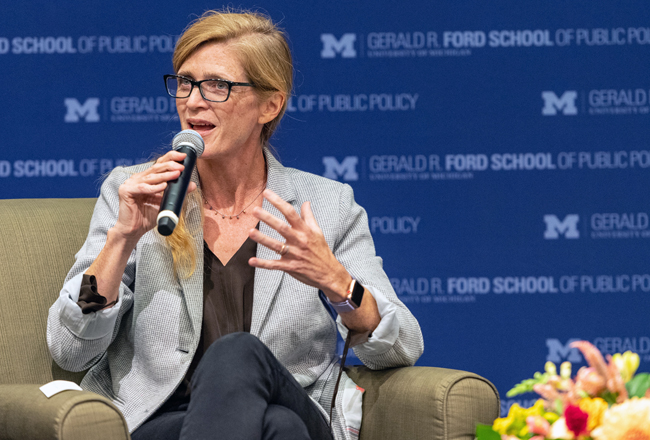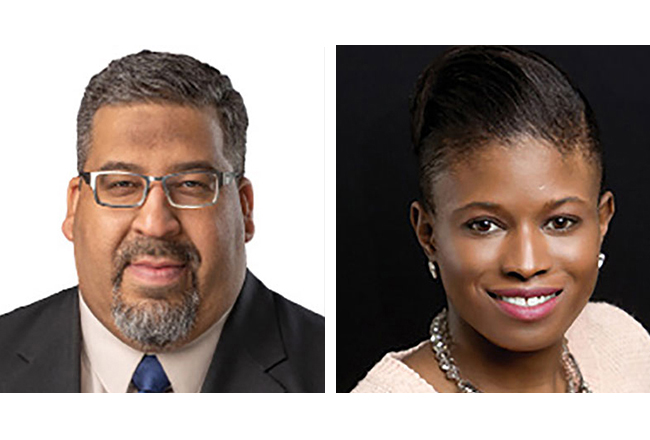Samantha Power”™s career has mostly been aimed at the world stage, first as a war correspondent covering the collapse of the former Yugoslavia, then as the founding executive director of Harvard University”™s Carr Center for Human Rights Policy, followed by positions within the Obama administration”™s State Department that culminated in the appointment of U.S. ambassador to the United Nations, and now as President Biden”™s appointment to run the U.S. Agency for International Development.

But in a recent Zoom lecture sponsored by Rye”™s Jay Heritage Center, Power raised her concern that internecine strife that she witnessed in the former Yugoslavia could easily take root and metastasize in this country as political divisions deepen with no clear evidence of common ground ”” or even a common source of information.
“There is massive misinformation,” she said. “You could argue that now the issue is massive decentralization of media, with no fact checking and with conspiracy theories running amok. We”™ve seen in our own media ecosystem photographs that have been used to incite fear and or hate, and then somebody will point out, ”˜No, actually that”™s a photograph from 10 years ago.”™”
While observing that “America and our established democracy was very different than a country like Yugoslavia that had come out of years of dictatorship,” this country has failed to establish an immunity to “hate crimes, even intolerance, extremism and radicalization.”
But Power also warned about demonizing either side of the current divisions.
“If we just look at the people that have gone to extremes here ”” they”™ve become more susceptible to conspiracy theories,” she said. “There are no umpires in our social media echo chambers and we can wall ourselves off from alternative viewpoints. But in those echo chambers, one of the main things that”™s happening is that people are being convinced that a caravan of immigrants are storming across the border ”” not only to take your job and to sort of suck off the welfare state, but potentially to do far worse. Right?
“And we saw the fears of cities being overrun by Antifa and how that becomes a justification to then actually radicalize yourself,” she continued, pointing out that a similar situation occurred in war-ravaged Yugoslavia during the 1990s. “The issues in the Balkans persist today: if you talked to the Bosnian Serb militia, as I did in my early twenties, the mindset was: ”˜These Muslim jihadis are coming. If we don”™t kill, we will be killed. If we don”™t push them out, it will be a kind of Lebensraum or some distortion of a very expansive idea of self-defense.”
Power theorized that U.S. extremism has permeated into more mainstream circles due to changing demographics coupled with perceptions of economic inequality.
“There is a desire to have the status quo and a fear of the new and the other,” she said. “I don”™t want the message to be these are the same and we”™re heading to the pathway of civil war, although, the events of January and those in Michigan before it and so many of the radicalized incidents and hate crimes that we”™ve seen.”
While acknowledging that some extreme solutions have been raised to combat this problem, including increased federal regulation of social media and the big-tech companies that control those platforms, Power proposed the dialing down of hostilities could take place if more people were “cross pollinating enough with people with whom they disagree, in real life and not just in these echo chambers,” but she ruefully stated that the roots of this dilemma are very deep.
“There”™s a portion of it that”™s really rooted in fear, and how do we find even channels of communication to address that?” she asked. “You know, more people had married Kardashians in this country than had died of Ebola ”” but at the height of the Ebola hysteria, it didn”™t matter. What mattered was that people were being stoked to believe that if health workers returned (from West Africa) we were going to be overrun with a pandemic.
“It”™s a code we haven”™t cracked, but that requires outreach that that has been harder and harder to do. But you have to start by seeking to meet people where they are, which is not easy in a world in which we”™re so silent.”





















